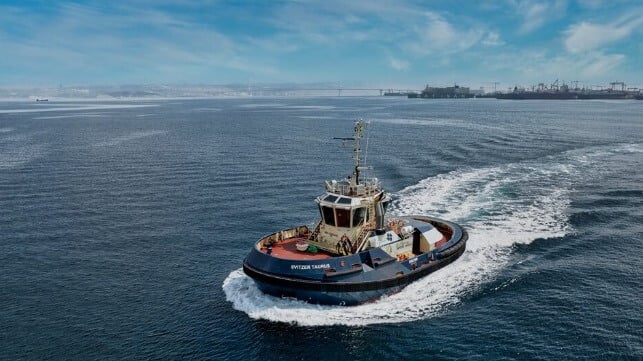To Decarbonize Towage, Svitzer Thinks Like a Startup
 Towage provider Svitzer is known for its global scale, but it’s also making a name for itself in low-carbon towing. Together with customer Hoegh Autoliners, it recently rolled out its first very-low-carbon towing service, powered by carbon insetting from biofuel consumption across Svitzer’s global fleet. To find out more about the ideas that power Svitzer’s green transformation, TME spoke with head of decarbonization Gareth Prowse (left).
Towage provider Svitzer is known for its global scale, but it’s also making a name for itself in low-carbon towing. Together with customer Hoegh Autoliners, it recently rolled out its first very-low-carbon towing service, powered by carbon insetting from biofuel consumption across Svitzer’s global fleet. To find out more about the ideas that power Svitzer’s green transformation, TME spoke with head of decarbonization Gareth Prowse (left).
TME: Could you tell us about your background and how you came to work in maritime decarbonization?
I started with a marine biology degree and a PhD in organic pesticides and ecotoxicology. Following that, I ended up in the coatings industry doing environmental and human risk assessment for marine paint products, particularly anti-fouling solutions. As my career progressed and corporate social responsibility and sustainability became more important, I focused on how coatings can drive emissions reduction in vessels.
Three years ago, I was fortunate enough to join Svitzer as head of decarbonization to set the strategy and direction of travel for our tug fleet. For years I was around the industry looking in, and it’s been great to be inside the industry looking out for a change.
What does it take to reduce emissions across a fleet of 450 tugs worldwide?
So I think it’s a bit of a hackneyed statement these days, but it’s true that there’s no silver bullet, no single solution that’s really going to help you to achieve your goals when it comes to decarbonization. We need flexibility in our approach. We have to consider vessel age, equipment, operational profile, and regional limitations with respect to biofuel and shore power availability.
Our strategy operates across three key themes: behavior, equipment, and fuel. Solutions range from slower transit speeds to shortening transit distances to using drop-in biofuels. Each region has different macroeconomic drivers and regulatory frameworks, which influence available solutions. For example, biofuels are widely available in Europe but less so in Australia, so we need different solutions for different regions.
What’s different about dec…
CONTINUE READING THE ARTICLE FROM The Maritime Executive HERE



Comments are closed, but trackbacks and pingbacks are open.